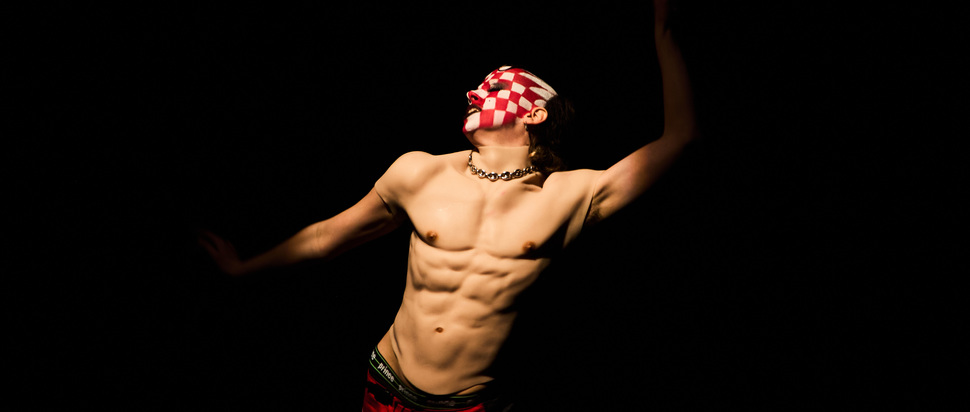Break the Binary: Wet Mess on drag spectacle TESTO
We chat with drag artist Wet Mess about their blazing experimental show TESTO and the blurred lines between performance and authenticity
Can you tell me about TESTO? How did it come about?
TESTO came about from wanting to develop beyond five minute drag acts. I wanted to push myself to make something longer and be able to take the audience on more of a journey than what you are limited to in nightlife. It's my first full length solo show. The show is about testosterone, non-binary transition and the edges of drag. How we use the stage to dream and re-create ourselves and the blurry lines of trying to bring that into reality.
I’m really interested in this idea of dreaming and recreating the self. There’s a really interesting tension between authenticity and performance here – they’re often seen as being in a binary but drag works to blur the lines.
It's interesting as drag is often seen as a character separate to oneself. I think a lot of queer/trans people can relate to the experience of recreating [and] redefining themselves on stage. Maybe there’s a more authentic feeling on the stage than ‘real life’ where we get to be free from the restrictions society can put on us. Drag has been very tied up with my personal gender journey, as someone whose drag name has become their real name. I very much know and feel the beautiful messy cycle of imagining oneself again and again. Gender is a performance on and off the stage.
I really love this idea of drag and performance being a kind of liberation – do you find this same liberation in your other practices, like choreography and costuming?
I feel like they are all so intertwined, actually. The costume helps the drag, the movement is a release. But yeah, sometimes the stage can feel like the freest place to be. I think especially for gender non-conforming people, public interactions can be difficult; although you're highly seen on the stage, somehow lots of other rules don’t apply.
You’ve described your drag work elsewhere as straddling the line between the sexy and grotesque. What is the significance and value of the grotesque when exploring sexuality and desire?
I think it is probably tied to normative expectations of what is attractive and who and where and how you're allowed to express desire. I think the best work is sexy. What is grotesque? What is sexy? You decide.
What does sexy mean in the context of your work?
I think perhaps it’s quite heavily influenced from working as a gogo dancer. There is such a power to enjoying your body [and] nudity for others to watch. I think a lot of people disregard the power of sexuality in performance, I think sex work is a form of art really. One of my mottos is ‘everything is sexy nothing is forever.’
That is such a baller motto. I want to think about the titular testosterone – there’s a line in Paul B. Preciado’s Testo Junkie that says “I’m not taking testosterone to change myself into a man or as a physical strategy of transsexualism; I take it to foil what society wanted to make of me” – thinking of hormones not as a catalyst towards assimilation but as a disruption. Does this speak to your work?
It's interesting we have very little public knowledge/discourse around testosterone and often it is very binary: “You want to become a man.” I am definitely interested in blowing that wide open and making it more human. I think hormones can give the autonomy to disrupt society’s expectations. Through the process of the show I interviewed a lot of people about their experience of taking T, from some people being on and off it to someone taking it since the 90s. I used the show to kind of do the research I needed for myself. It truly is different for everyone.
Was there anything that surprised you from people’s testimonials?
That I gained more talking to them about their lives than about the practicalities of their transition. We often started out talking about hormones and then would just expand to life chats.
I’m really interested in complicating this straightforward narrative of testosterone as just about “wanting to become a man.” I was thinking a lot of Donna Haraway’s Cyborg Manifesto when encountering your work and meeting points of human and “machinery.” I'm interested in how testosterone can become a kind of technology that allows us to break past preconceived boundaries in a liberatory way? Like is it almost about going beyond definitions?
Yes, I think it’s Preciado that talks about ‘hacking gender’ or being a ‘lab rat’. Our understanding of hormones is very tied up with binary cultural narratives and stories. All hormones are non-binary. When we start to understand the vast expansiveness of gender we can start to see how hormones are all just ingredients in the delicious gender soup.
In the words of my pal Santi: “I want to go home and soak myself in a bathtub of testosterone, while gnawing on an oestrogen sandwich in my glitter Speedos.”
TESTO, ZOO Southside, 11-25 Aug (not 12 & 19), 8.30pm, £13-16, part of the Here & Now Showcase
